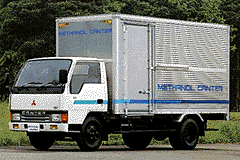

As a fuel, methanol has several environmental advantages over both petrol and diesel. In use, it generates less CO2 than either petrol or diesel; less NOx, hydrocarbons and carbon monoxide than diesel and no black smoke or SOx at all. The problem is current methods of producing methanol require so much power that there is no overall savings in CO2.Methanol vehicles also emit formaldehyde, but Mitsubishi has made great strides in controlling this problem. Methanol is such a promising fuel that Mitsubishi has worked hard to become an industry leader in developing commercially viable methanol vehicles.

 Fleet Tested Vehicles
Fleet Tested VehiclesIn the 1980s, Mitsubishi developed a passenger car that runs on an 85:15 mixture of methanol and petrol for a fleet test program sponsored by the Japanese Ministry of International Trade and Industry. Mitsubishi also developed a city bus for MITTs fleet testing that runs on 100% methanol.Mitsubishi has also developed a Flexible Fuel Vehicle (FFV) that can run on any petrol/methanol mixture. Mitsubishi FFVs are currently on loan to the California Energy Commission for fleet testing.
 Methanol Canter
Methanol CanterMitsubishi's 4D32 methanol engine has been so successful that Methanol Canter light-duty trucks are being used in Japan by private companies as part of a practical on-the-road test of their commercial viability.

NEXT TOPIC:"Zero Emissions"

![]() Copyright 1995 by Mitsubishi Motors Corporation.
Copyright 1995 by Mitsubishi Motors Corporation.